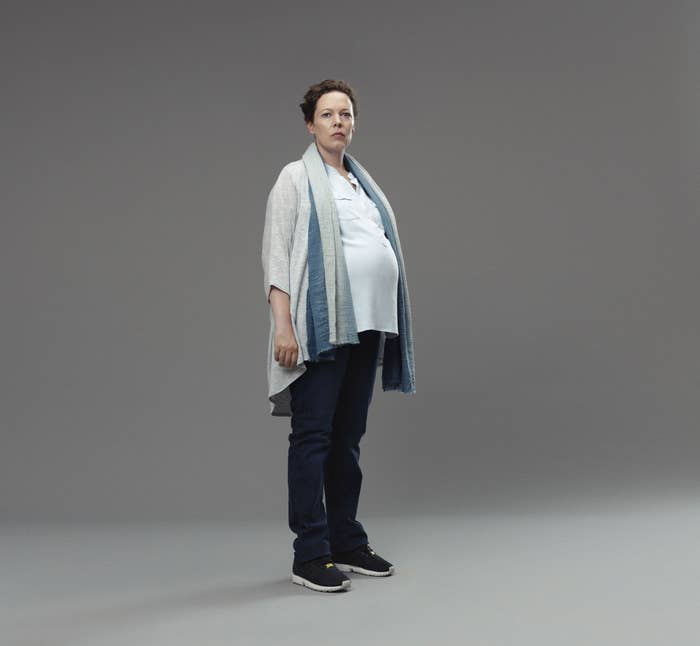
From the first installment of AMC’s six-episode spy caper The Night Manager, Angela Burr (Olivia Colman), a British intelligence operative, has been pregnant and working. Men around her are occasionally paternalistic, and she checks them immediately. The show never dwells on her pregnant status, it’s just a fact.
The insignificance of her pregnancy — which was written into the show to accommodate Colman’s real-life pregnancy — is quietly groundbreaking.
Stereotypes tell us that a pregnancy makes a woman fragile, and the growing fetus must take precedence over every other aspect of her life; Colman’s Angela doesn’t give a shit about the stereotypes. The audience first meets the character pre-pregnancy. She’s “headstrong” and a swift, urgent worker who’s hell-bent on taking down illegal arms dealer Richard Roper (Hugh Laurie). After a time jump in the first episode, Angela is quite visibly pregnant. And it’s beside the point. She still simply wants to nail a criminal to the wall.
Bucking the pop culture image of a dainty, expectant woman who has to focus on nesting, she keeps at her life’s work, pregnancy notwithstanding. In the second episode, her old CIA friend Joel (David Harewood) appears surprised that she never mentioned the pregnancy to him. She shrugs it off — she never mentioned it, it seems, because she feels she has more noteworthy things going on. As she tells her operative Jonathan Pine (Tom Hiddleston), “I’ve spent 10 years of my life” going after Richard Roper. A little bun in the oven is not going to slow her down.
The series is remarkably equitable in its treatment of Angela. She’s presented as sexually desirable — Joel makes it clear he's attracted to her. When she’s questioned about the amount of time she’s devoting to work, she says that her husband defers to her judgment on an appropriate schedule during a pregnancy (she is, after all, the one who’s pregnant). When Joel patronizes her — “When was the last time you got some rest? Why don’t you go home, get some sleep?” — she pulls away from him, making sure he sees she’s offended.
After her enforcement agency is technically shut down, a co-worker tells her, “Go home, Angela. Have your baby. Be a teacher’s wife.” Her indirect response is to double down on her crusade, at one point referring to her pregnancy as a “perfect cover.” Shortly thereafter, as she’s trapped, hiding in a bathroom and fearing for her life, she touches her belly in a way that suggests she is also afraid for her unborn child’s life. But, despite the flash of concern for the baby, she continues to place herself in harm’s way in pursuit of her bigger goal: She ably shoots a man in the leg to save another woman, and she waits to ambush Roper. Her momentary maternal flinch doesn’t preclude her last act in the miniseries from veering sharply away from the motherly ideal: When Roper is finally caught, she does nothing to prevent him from being assaulted by his disgruntled associates. “He deserves it,” she says with a cruel smile.
Through a decade of unwavering persistence, Angela Burr successfully coordinates the toppling of an arms dealer, and she happens to do it while she’s pregnant. Much like in real life, she is not magically transformed by the experience of carrying a child — on the contrary, she remains as focused on her objectives as ever. Her own existence trumps the unborn baby’s, again and again. She is not subsumed by pregnancy, and she rejects all attempts by others to determine what is right for her and her baby. The world may tell her that pregnant people should be more careful, but all Angela heard them say was mother knows best.

